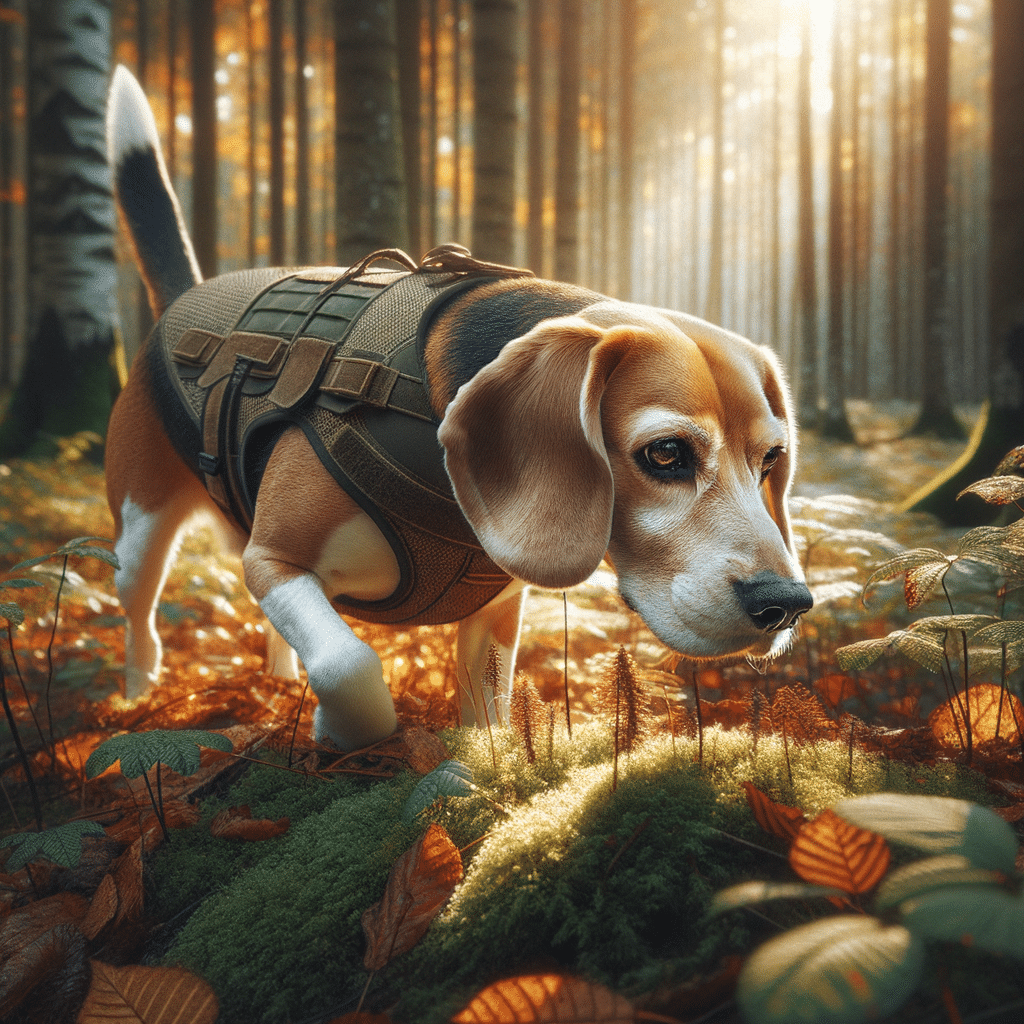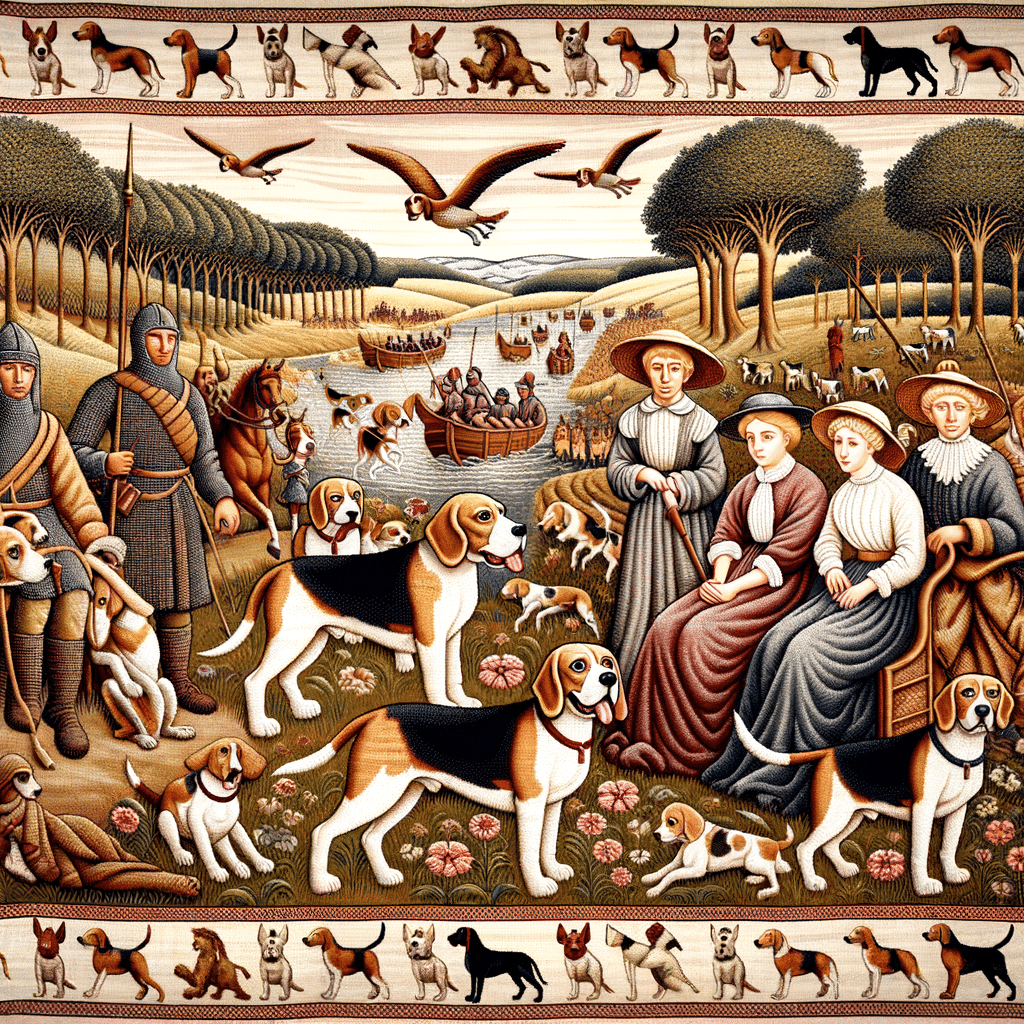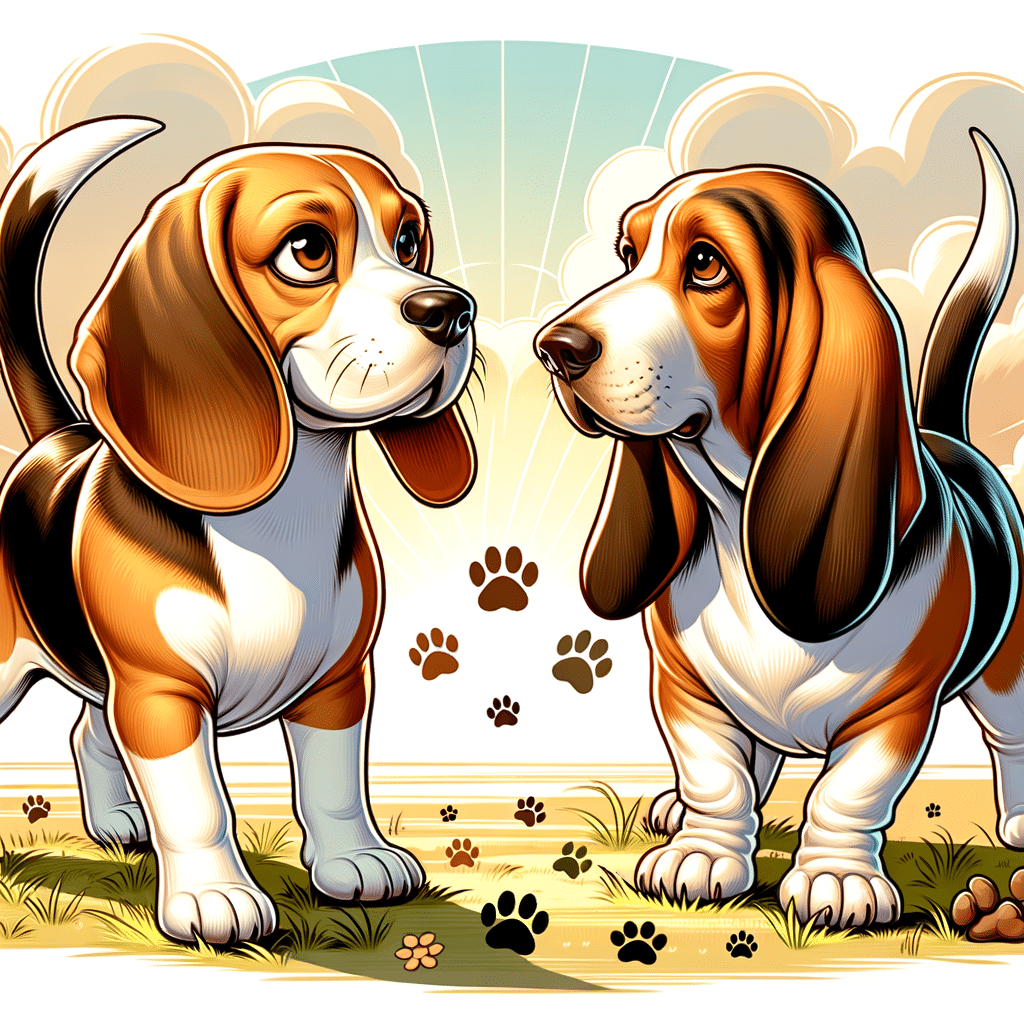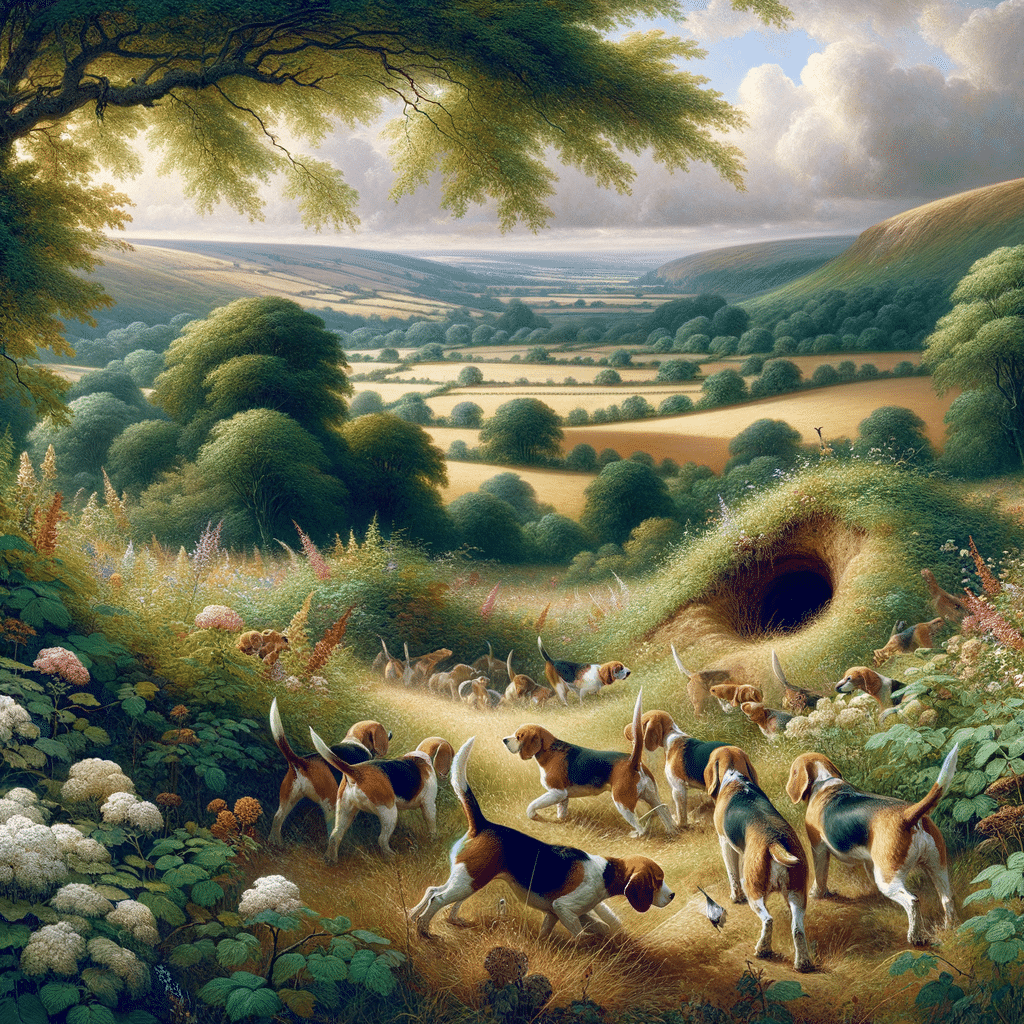Let’s compare dog breeds. To examine the differences between beagles and bluetick hounds, it’s important to note the distinct traits and backgrounds that set these dogs apart. Beagles are small- to medium-sized dogs known for their excellent sense of smell and tracking abilities. Beagles are a staple in hunting packs and a beloved family pet.
In This Article
On the other hand, the bluetick hound, often referred to as the bluetick coonhound, is larger. This dog breed also has a unique ticking pattern on its coat and is renowned for its skill in tracking and treeing raccoons, true to its namesake.
Despite their shared affinity for hunting and scent work, these two popular dog breeds have different grooming needs, care requirements, and roles in human society. Beagles are versatile, friendly, and adaptable, often used as detection dogs due to their keen sense of smell.
With their strong hunting instincts and vocal nature, bluetick hounds require a lot of exercise and are a good fit for owners with an active lifestyle or hunting interests. However, both breeds share a deep-rooted history in their roles as hunters and companions.
Highlights
- Beagles and bluetick hounds are skilled hunting breeds with distinct physical and behavioral traits.
- Each breed has specific care requirements that fit their energy levels and work capabilities.
- These dogs have close-knit roles within human society, from companionship to specialized scent work.
Breed Comparison
When choosing between beagles and bluetick coonhounds, you should learn more about the different origins, sizes, personalities, and dog health needs. These play a prominent role in determining whether a bluetick hound or beagle would be a good fit for your home.
Origin and History
Beagle
- Origin: England
- History: Developed as scent hounds for hunting small game.
Bluetick Hound
- Origin: United States
- History: Bred from the Bleu de Gascogne hound of France, the English foxhound, the Cur, the American foxhound, and the Black and Tan Virginia foxhound to track and tree raccoons.
Physical Characteristics
Beagle
- Size: Small
- Weight: Under 30 pounds
- Height: 13 to 15 inches at the shoulder
- Coat color: Short-haired, weather-resistant, typically tricolor or red and white.
Bluetick Hound
- Size: Large
- Weight: 45 to 80 pounds
- Height: 22 to 27 inches at the shoulder
- Coat color: Coarse, dense; notable for its blue-ticked pattern.
Personality and Temperament
Beagle
- Temperament: Friendly, gentle, and loving; a good fit for families and children.
- Personality: Intelligent but sometimes stubborn; requires patient training.
Bluetick Hound
- Temperament: Intelligent, loyal, and friendly; good with children.
- Personality: Strong hunting instincts, may pursue scents persistently; needs regular training and exercise.
Health and Lifespan
Beagle
- Health problems: Prone to obesity, hip dysplasia, cherry eye, and allergies.
- Average lifespan: 10 to 15 years.
Bluetick Hound
- Health problems: Can suffer from hip dysplasia and other genetic disorders; less prone to obesity than beagles.
- Average lifespan: 11 to 12 years.
Care Requirements
Proper care for beagles and bluetick hounds is essential to their well-being; it involves grooming, exercise, training, and diet. Both breeds share many care requirements but need different levels of effort and focus because of their unique behaviors and physical features.
Grooming and Shedding
Beagles
- Coat: They have a short, dense, and weather-resistant double coat.
- Shedding: Beagles are moderate shedders who need weekly brushing to remove loose hair.
- Grooming tips: Remember to clean their ears and trim their nails regularly; this is important because of their floppy ears and active nature.
Bluetick Hounds
- Coat: They have a coarse coat with a smooth, glossy appearance.
- Shedding: They shed frequently and may require more brushing as seasons change.
- Grooming tips: Consistent grooming habits are essential; check their ears regularly for signs of infection.
Exercise and Activity Level
Beagles
- Exercise: This dog breed needs a lot of exercise to prevent boredom and obesity. Try to exercise them for at least one hour a day.
- Activity level: Beagle dogs are active and benefit from interactive play sessions and scent games.
Bluetick Hounds
- Exercise: These dogs require intense daily exercise to match their high energy levels; they are a good fit for an owner or family with an active lifestyle.
- Activity level: Their background as hunting dogs means they need ample exercise and outdoor activities for their health and happiness.
Training and Socialization
Beagles
- Training: Positive reinforcement methods work well because this breed is intelligent but stubborn.
- Socialization: Early socialization with people and other dogs will prevent shyness or aggression.
Bluetick Hounds
- Training: Their intelligence and keen scent abilities make bluetick coonhounds easy to train, but consistency is key.
- Socialization: Because of their strong hunting instincts, dogs need a lot of socialization, which helps them become well-rounded companions.
Diet and Nutrition
Beagles
- Diet: Because beagles are prone to obesity, their diet should be carefully measured and monitored.
- Nutrition: Feed your beagle high-quality dog food that is age, weight, and exercise-appropriate.
Bluetick Hounds
- Diet: These dogs have big appetites that match their energy levels but avoid overfeeding them.
- Nutrition: A balanced diet with proper protein will support their active lifestyle, but they should also remember to perform regular weight checks.
Beagle vs Bluetick Hound: Role in Human Society
Both beagles and bluetick hounds have clear roles in human society through their incredible hunting skills and positive attitudes as family pets. They also contribute to various industries, including science and public safety, and have a significant presence in popular culture and media.
Beagles and Blueticks as Hunters
The beagle is a purebred scent hound, well-known for its sharp sense of smell and intelligence. These make it adept at hunting rabbits and hares. Originally from the United Kingdom, the Beagle’s ancestry includes breeds like the southern and basset hound. Due to their size and agility, both pocket beagles and standard beagles are used for hunting.
The bluetick coonhound is known for its strong prey drive and endurance while hunting. It specializes in tracking and treeing wild game, including raccoons.
Beagles and Blueticks as Family Companions
Beagles are known for their friendly personalities and are great with families and children. They adapt well to apartment living and are affectionate companions. Bluetick hounds also have a friendly demeanor and thrive in environments where they can participate in family activities.
Contribution to Science and Safety
Due to their remarkable sense of smell, beagles are often employed by law enforcement in scientific research and at airports to detect prohibited substances. Their sharp sense of smell ensures public safety and contributes to advancements in medical and scientific studies.
Frequently Asked Questions
People ask common questions about the features and differences of beagles, bluetick hounds, and related mixes.
What are the temperamental differences between beagles and bluetick hounds?
Beagles are known for being friendly, curious, and happy, while bluetick hounds are more reserved but equally clever. Bluetick hounds often showcase a strong prey drive and a more serious mood when working.
What are the physical characteristics of a full-grown bluetick-beagle mix?
A full-grown bluetick-beagle mix typically has a distinctive coat pattern with a black or white base color speckled with blue or grayish spots. They closely resemble beagles with a compact and muscular build.
What are common health concerns associated with a blue beagle?
Common health issues for bluetick-beagle mixes include hip dysplasia, ear infections, and epilepsy. Regular check-ups and preventative care are important for their well-being.






